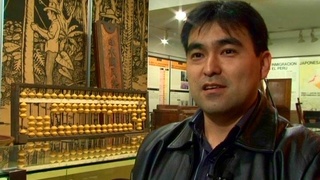Interviews
Coming to Japan
You know, because I lived in Pittsburg my whole life, it was the first time I had seen so many people in one place, at one time. You know, going to places like Shinjyuku and Shibuya, Ropponji…just seeing so many people and getting on trains with so many people…that was kind of a big shock to me. You know, Pittsburg is…is a city, but its not a very big city. So that was the first thing that I was, you know, actually surprised by… Just the amount of people in Japan. You know, because I, you know, ate Japanese food at home and I knew a lot of Japanese culture, and you know, was starting to study Japanese when I first got there, you know, one of the main things that I was really, really…I really wanted to do was, you know, buy enka CDs and listen to enka and watch enka shows and, you know, go to karaoke, and you know do things like that. I wanted to do…learn more and you know get more into the music. And that was one of the things I was really looking forward to when I was there.
Date: March 30, 2010
Location: California, US
Interviewer: Yoko Nishimura
Contributed by: Interview by Watase Media Arts Center, Japanese American National Museum. Courtesy of Japanese American Cultural & Community Center









